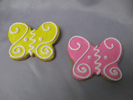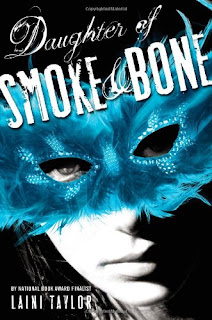
Well, I read these books a little while ago (over a month), so I've forgotten some of the finer details that I may have wanted to mention in this triple review. The books aren't necessarily galleys anymore, and there might be a few spoilers, but here goes:
Between Shades of Gray; author
Ruta Sepetys:
A Holocaust story that's not about the Holocaust,
Between Shades of Gray describes how fifteen-year-old Lina and her family are put on a train to Siberia by the Soviet secret police. Lina's father is separated from them, and she spends a long time wishing that they will find him alive. This was a powerful book. Sepetys's writing is simple but beautiful, and she's not afraid to make the book dark. However, I had a few problems with the book. To start, although Lina is an artist and sketches messages to her father throughout the story, none of these pictures appeared in the book. I was sorely disappointed to only have to imagine what her messages looked like. Then, the ending left me dissatisfied. It stops, then the epilogue says that Lina escapes the labor camp! I wanted to know what happened inbetween. The book had enough of a flow that another hundred pages to have her escape wouldn't have hindered it. Overall, I give the book a 3.8. It was like one of those shortbread cookies that have hard sugary icing on them, but without the icing. Tasty enough, elegant, but it could have used that little bit more. I've included a picture of these cookies in case you don't have a clue what I'm talking about.
 Shut Out
Shut Out;
Kody Keplinger:
In the school of Kody Keplinger's
Shut Out, the football team and the soccer team have a vicious rivalry. This rivalry involves throwing eggs at each other and physically harming each other. Lissa, girlfriend of a football player, is tired of the rivalry and calls on all the girlfriends to band together and go on a "sex strike" until the boys quit their rivalry. Inevitably, though, she finds herself falling for Cash Sterling (who in their right name would name their kid that?), a soccer boy. I had a number of thoughts about this book, most of them not too favorable. First off, why doesn't the school administration EVER step in on this rivalry?? It's been going on for years, yet no one see

ms to do anything about it. Next after that was how NO ONE EVER DOES ANY SCHOOLWORK. Really. They're all in high school, yet they have hours and hours to fool around and/or have sleepovers, yet never seem to be in school. Okay, it's possible there were some homework scenes and some school scenes, but I can't remember them right now (I read the book a little while ago). Then there's a scene where Lissa and the girls are having a sleepover, and the boys pull off their shirts outside in the backyard to tempt the girls. Lissa notes that "these were some of the most athletic boys in school, which meant they had some of the best bodies. It was like a museum of muscled arms and six-pack abs on Kelsey's lawn." THAT IS NOT HOW IT WORKS. Just because a guy is an athlete does not mean he has amazing muscles. There is no "museum" at our school. Next point: while it's nice that the girls are able to talk so honestly about sex and they bring up interesting points, their conversations felt rather forced. Girls don't just sit around and have sleepovers where they talk about sex. At least, not in my experience. Perhaps the author has had a different experience.
Okay, deep breath now. This book did have some positives. There was definitely a girl-power element to it that I liked, and Lissa felt like a realistic and relatable character. She struggles with some control issues, has a job at the library, and has some boy problems. Some of the scenes between her and Cash were sweet, although a little overly sweet at times. I just didn't relate to this book as much as I imagine other girls might, which doesn't make the book bad. It just wasn't really my cup of tea in addition to not being a stellar book, hence the negative points above.
Overall, I'm not entirely sure how to rate something like this. On the number scale, it gets a 1.5, maybe a smidgen higher. Food-wise, it was a day-old Dunkin Donuts donut: it was pretty tasty at one point, but now it's fairly inedible (at least to me). If you like your donuts slightly stale, then hey, it's a snack.
Bunheads;
Sophie Flack:
Hannah is a dancer; dancing is her entire life. She left her family at a fairly young age (the exact number is escaping me) to dance with the Manhattan Ballet, and her burning ambition is to be a soloist. She is starting to realize, though, that she may want something more than the high pressure world of ballet. Bunheads was something like the movie Black Swan in that it has a protagonist with a desire to rise to the top, except
Bunheads was significantly less disturbing and had no mental breakdown and death at the end (sorry to spoil the movie for anyone who hasn't seen it. Don't w

orry. It will still be disturbing.)
I really liked how Sophie Flack built the world of ballet in her book; as an outsider looking in, it was fascinating and a little sad, given how anyone who doesn't have the typical "ballerina body" has extremely low self-esteem, and even those that DO have the body worry about their weight constantly. Hannah's joy whenever she performs is vivid, and something that readers can relate to even if they are not a dancer. I liked Hannah's progression as she wakes up to the outside world, but her final decision bothered me a bit. It felt somewhat like an all-or-nothing decision that left her staring at what she could have had, when she could have made a decision that was more in the middle. In addition, especially at the beginning of the book, Flack's inexperience as a writer shows; the writing isn't as good as it could be, though it improves as the story continues. Given her background as a dancer, this isn't exactly surprising (after all, dancing is a different experience from writing), but given this fact the book is still wonderful. There is one scene that I keep thinking about, in which Hannah is ruminating on a little girl who wants to be a ballerina and loves to dance, but so clearly doesn't have the body for it. Hannah's sadness, both for this little girl and that child she once was, is beautiful portrayed. This book was so sweet, and I look forward to other books Flack might write.
When all is said and done,
Bunheads gets 4 stars. It was like chocolate ice cream, delicious and sweet. It's a flavor that you may have eaten as a little kid when you were really picky about funny things in your ice cream, and you look back on it fondly after eating it.
Here's an article that
The Boston Globe printed about Sophie Flack and her emergence into the writing world:
http://articles.boston.com/2011-10-11/ae/30267383_1_balanchine-nycb-novel
































